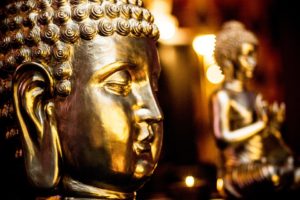If you are practicing the Mahayana path of Buddhism which can also be dubbed as “Tibetan Buddhism,” you will be taught about the “Three Poisons.” The Three Poisons of Buddhism are considered to be the “Three Roots” of all suffering. Suffering is the main principle of Buddhism’s “Four Noble Truths.” The Three Poisons of Buddhism are listed as the following: Lobha which is greed/desire, Dvesha which is anger/hate/animosity/aversion, and Moha which is ignorance/delusion.
All three poisons are the cause of suffering in regards to Buddhism.
Because of the theme of “suffering,” the Three Poisons are prelude to the Four Noble Truths.
In regards to Lobha, we may desire something that we think could give us gratification. One could compare this to lust. Lust, in Christianity, is considered to be one of the seven deadly vices.
 We tend to desire what we cannot have. Once we have it, we could succumb to greed and want even more. Thus, that leads to our suffering. If we desire fame and attain it, we may not feel content. Thus, we desire more fame. If someone has more fame than us, we may desire to take that fame away. That leads to our suffering.
We tend to desire what we cannot have. Once we have it, we could succumb to greed and want even more. Thus, that leads to our suffering. If we desire fame and attain it, we may not feel content. Thus, we desire more fame. If someone has more fame than us, we may desire to take that fame away. That leads to our suffering.
In regards to Dvesha, we may have anger, hatred, ill-will, and so forth to other people. We may feel that way because we feel wronged for what they did to us in the past. We may feel that way because they have what we do not have. Examples would be economic class, social class, job positions, prestige, etc. We can become jealous which transforms into hatred and ill-will. Thus, that leads to our suffering.
In regards to Moha, we are ignorant in our own delusions. We do not really think things true. Thus, we are ignorant in our own greed and desires. We are deluded that we are constantly in the wrong. Those delusions lead to our suffering.
But, we can cleanse our bodies of those three poisons.
The method is listed in the Four Noble Truths:
The first Noble Truth
Dukkha, the first Noble Truth, says that as long as we live, we will suffer one way or another. That is something we have to accept. We have to accept that people will have what we desire and vice-versa.
The second Noble Truth
Samudaya, the second Noble Truth, says that we must examine ourselves and find the roots of our suffering. Thus, that brings us to the first Poison or Root Evil. As long as we succumb to the third poison, that root continues to grow.
The third Noble Truth
Nirodha, the third Noble Truth, says that we can cure ourselves by getting rid of those roots. In this respect, we let go of our attachments, desires, delusions, etc. Thus, we tear away at those roots. We cleanse ourselves of those Three Poisons.
Magga, the final Noble Truth, gives us the remedy: the Eightfold Path.
Thus, you have the Three Poisons of Buddhism which goes into Buddhism’s Four Noble Truths. Then, you go into the Eightfold Path which consists of: Right View, Right Intention, Right Speech, Right Action, Right Livelihood, Right Effort, Right Mindfulness, and Right Concentration.





